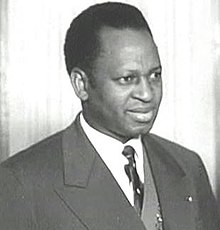Fodéba Keïta
Fodéba Keïta | |
|---|---|
 | |
| Minister of Defense | |
| In office 1961–? | |
| Personal details | |
| Born | January 19, 1921 Siguiri, Guinea |
| Died | May 27, 1969 (aged 48) Guinea |
| Occupation | Dancer, musician, writer, playwright, composer and politician |
Fodéba Keïta (January 19, 1921 in Siguiri – May 27, 1969 at Camp Boiro) was a Guinean dancer, musician, writer, playwright, composer and politician. Founder of the first professional African theatrical troupe, Theatre Africain,[1] he also arranged Liberté, the national anthem of Guinea.
Early years
Keïta was the son of a male nurse.[2] He received his early education at the École normale supérieure William Ponty.[3]
Career
During his law studies in Paris in 1948, he founded the band Sud Jazz. Beginning in the late 1940s, he founded Théâtre Africain (later Les Ballets Africains),[4] a successful ballet group which toured Africa for six years and later became the national dance company of Guinea; then president of Senegal Léopold Sédar Senghor held it in high esteem.[5] With Kanté Facély and Les Ballets Africains, he became instrumental in showcasing previously unknown Mandé performance traditions to other continents as well.[6]
After returning to Guinea, he published the poetry collection Poèmes africains (1950),[3] the novel Le Maître d'école (1952), and in 1957, Keïta wrote and staged the narrative poem Aube africaine ("African Dawn")[7] as a theatre-ballet based on the Thiaroye massacre.[8] In African Dawn, a young man called Naman complies with the French colonial rulers by fighting in the French Army only to be killed in Thiaroye in Senegal, in a dispute between West-African soldiers and white officers.[9][10] However, his works were banned in French Africa as he was considered radical and anticolonial.[3]
Politically active in the
On May 27, 1969, he was shot dead without trial.[13][14]
Gallery
-
An ensemble directed by Fodéba Keïta performing in Germany (1951)
References
- ISBN 0-521-43453-X.
- ^ Taylor, Sidney (1967). Reuters ltd (ed.). The New Africans: a guide to the contemporary history of emergent Africa and its leaders (Snippet view ed.). Putnam. p. 1967.
{{cite book}}:|editor=has generic name (help) - ^ ISBN 0-8108-4634-9.
- ]
- ISBN 0-275-97586-X.
- ISBN 0-226-10161-4.
- ISBN 978-1-58046-330-0.
- ISBN 0-521-41139-4.
- ^ Esonwanne, Uzo (1993). "The Nation as Contested Referent". Research in African Literatures. 24 (4): 49–62.
- ISBN 9780226528021.
- ^ Legum, Colin (1961). Africa: a handbook to the continent. A. Blond.
- ISBN 1-84353-118-6.
- ^ African and Afro-American Studies and Research Center, University of Texas at Austin, 2001 "Research in African literatures, Volume 32"
- ISBN 3-7711-0153-0,
Works cited
- Iffono, Aly Gilbert: Lexique historique de la Guinée-Conakry, l'Harmattan, Paris, 1992.

